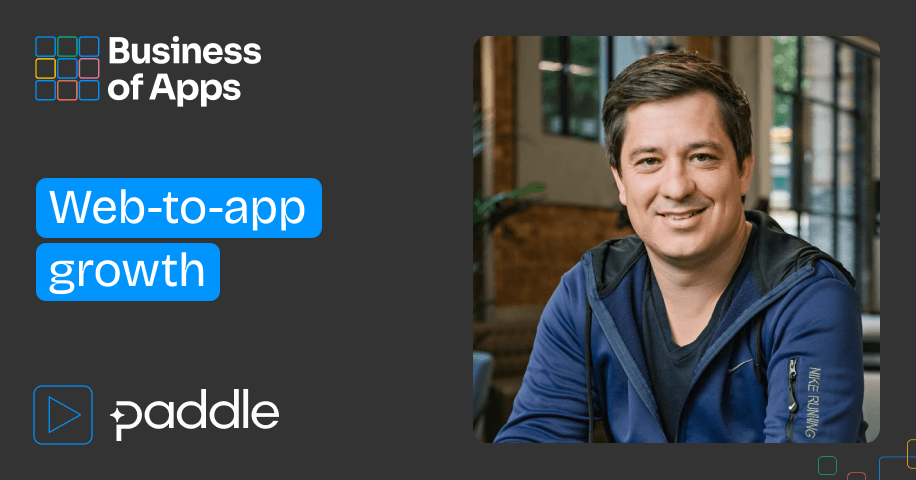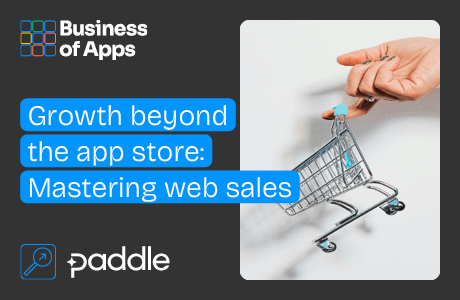In the increasingly expensive world of app distribution, where Apple’s 30% tax eats into margins and App Store discovery is becoming ever more elusive, one quiet revolution is reshaping how successful companies think about revenue: the systematic migration from app-store-only to web-first monetization.
In this episode of App Talk, we sat down with Andrew Davies, CMO of Paddle, who’s been watching a quiet revolution unfold in real-time. As scaled app businesses increasingly abandon single-channel dependence for web monetization, Davies has found himself at the center of a fundamental shift that’s rewriting the economics of app growth.
Davies brings a unique perspective to this conversation — a serial entrepreneur who chose the “disruptor” path over the traditional consulting track, and who now helps app companies solve what he calls champagne problems, i.e. the complex challenges that only emerge when you’re successful enough to have customers worldwide.
The champagne problem epidemic
While most app companies obsess over user acquisition costs and conversion rates, Davies identified a different category of challenge entirely. These aren’t the problems startups worry about, they’re the problems that successful companies suddenly face when revenue crosses certain thresholds.
“When you start selling, you have some revenue in different countries. That’s when you’ve got these problems of back office financial complexity,” Davies explains. “You’ve got customers in Lithuania, so you’ve got to remit tax to the local Lithuanian tax authority.”
This insight reframes the entire conversation around app growth. The real barriers to scaling aren’t just about finding users, but rather about the operational complexity that kicks in when you find them globally:
- Currency chaos: Managing payments across dozens of currencies while maintaining consistent pricing psychology
- Regulatory roulette: Navigating different tax laws, consumer protection requirements, and financial regulations in each market
- Fraud multiplication: Different regions have wildly different fraud patterns that require localized prevention strategies
The companies that thrive aren’t necessarily the ones with the best products, they’re the ones who solve these champagne problems before they become business-limiting constraints.
Why Eastern Europe is leading the web-to-app migration
One of the most fascinating patterns Davies has observed is geographic: the web-to-app movement isn’t following the typical Silicon Valley-to-everywhere path. Instead, it’s moving from east to west.
“Eastern European apps were early on it and now it’s flowing into Western and Northern Europe. APAC’s been doing some of it in the past, and now it’s moving to America. It’s one of the few trends I’ve seen that’s going east to west rather than west to east.”
This geographic anomaly reveals something profound about market dynamics and regulatory pressure. Eastern European app companies, operating in markets with lower consumer spending power and higher price sensitivity, were forced to innovate around Apple’s fee structure earlier than their Western counterparts.
But the implications extend far beyond geography:
- Regulatory arbitrage: Companies in more regulated markets developed compliance-first approaches that become competitive advantages globally
- Price pressure innovation: Lower purchasing power markets forced early experimentation with flexible pricing models
- Distribution diversification: Limited domestic market size pushed international expansion and multi-channel strategies from day one
American companies, historically insulated by market size and consumer spending power, are now adopting strategies that Eastern European companies pioneered out of necessity.
Web-to-app growth: Paddle’s approach
Source: App Promotion Summit
The 18-second window that saves $100,000
In the world of subscription apps, churn is inevitable. But Davies’ team discovered something remarkable: companies have exactly 18 seconds to transform a cancellation into a revenue-saving opportunity.
“You’ve got about 18 seconds maximum to pause that process to get some insight and to offer them something else,” Davies reveals. “You do not want to stop people canceling. They need to be able to cancel fast. But you want to just add a little bit of friction to ask them that question: Why?”
This insight led to the development of “salvage offers” — strategic interventions during the cancellation process that turn churn into retention opportunities. The results are dramatic. One case study showed a company saving $100,000 in the first 90 days, with 63% of users choosing an alternative to cancellation.
The 18-second framework works because it respects three critical principles:
- Data collection: Understanding why users want to leave provides product and marketing insights
- Value reinforcement: Reminding users why they originally committed can rekindle engagement
- Alternative offerings: Downgrade options, pauses, or price adjustments address specific pain points
This approach transforms churn from a binary outcome into a conversation, one that often ends with retained revenue and stronger user relationships.
The merchant of record advantage nobody talks about
While the industry focuses on payment processing and user acquisition, Paddle was built around a more fundamental insight: the future belongs to companies that can act as “merchants of record” for their clients.
“A merchant of record is the bundling of all of those back office tools,” Davies explains. “We’ve seen these problems a thousand times, and we’ve solved them once and for all.”
This positioning creates a unique competitive dynamic. While traditional payment processors handle transactions, merchants of record take legal and financial responsibility for the entire commerce relationship. This seemingly subtle difference has massive implications:
- Liability transfer: Paddle assumes responsibility for tax compliance, fraud prevention, and regulatory adherence
- Infrastructure elimination: Companies can focus on product development instead of building payment stacks
- Global expansion acceleration: New market entry becomes a configuration change rather than a multi-month project
The merchant of record model represents a fundamental shift from DIY infrastructure to managed infrastructure, similar to how companies moved from managing servers to using AWS.
What this means for apps
The insights from Davies’ work translate into several strategic imperatives for app companies:
Diversify revenue streams before you need to
The companies that will thrive are those treating web channels as primary revenue sources, not backup plans. Target 30-40% of revenue from web channels once you hit $10-20M ARR.
Build for churn from day one
Every subscription business will face churn. The successful ones plan retention strategies before they need them, not after users start leaving.
Choose managed infrastructure over DIY complexity
The era of building everything in-house is ending. Companies that focus on their core product while outsourcing infrastructure complexity will outpace those trying to do everything themselves.
Think geographically from the start
The most successful app companies are those that plan for global expansion from launch, not those that try to add international capabilities later.
Price experiment aggressively
Companies that change pricing quarterly outperform those that don’t by 103% on revenue per user. Pricing is continuous optimization opportunity, not a set-and-forget decision.
In an app ecosystem where sustainable growth increasingly depends on revenue diversification and operational efficiency, understanding how to handle payments, taxes, and compliance across multiple countries and regions becomes business-critical. The difference between solving these challenges proactively and addressing them reactively is often the difference between sustainable growth and operational overwhelm.
As Davies puts it: “Second time founders choose Paddle because first time round you don’t really know what the problems are that are going to come tomorrow. But second time round you think, okay, I’ll put something in place at the beginning that means I’m not building up debt for the future.”
The future belongs to companies that learn from second-time founders without having to become them first.
Recorded at App Promotion Summit London 2025, this interview is part of our ongoing App Talk series, where we dive deep into the strategies behind today’s most successful apps. Explore all our App Talk interviews here.











